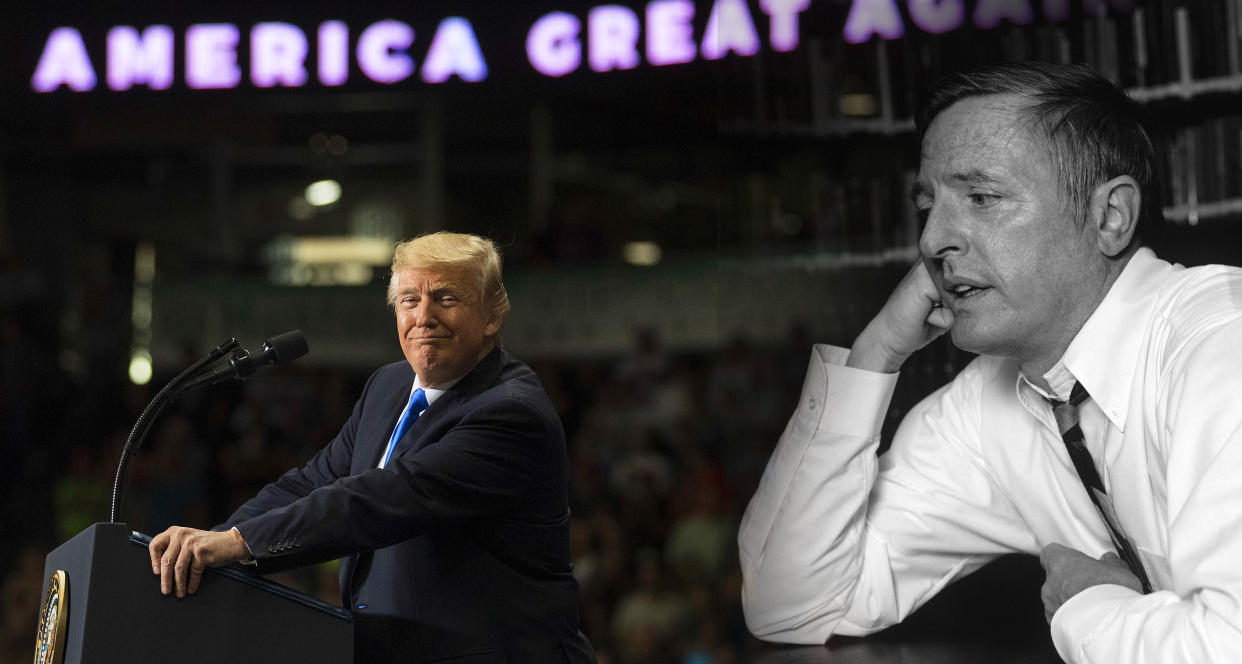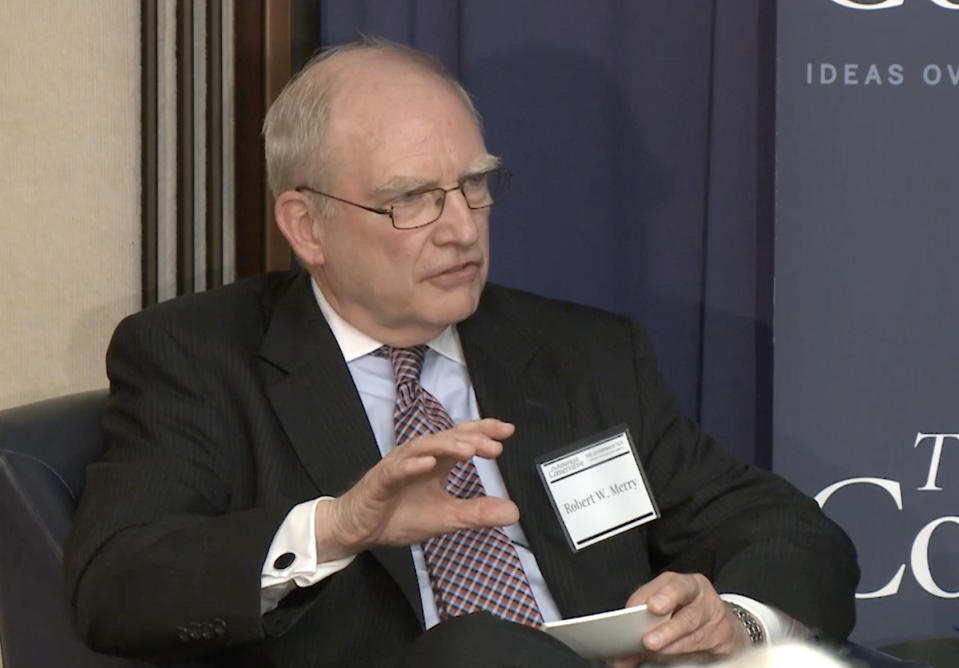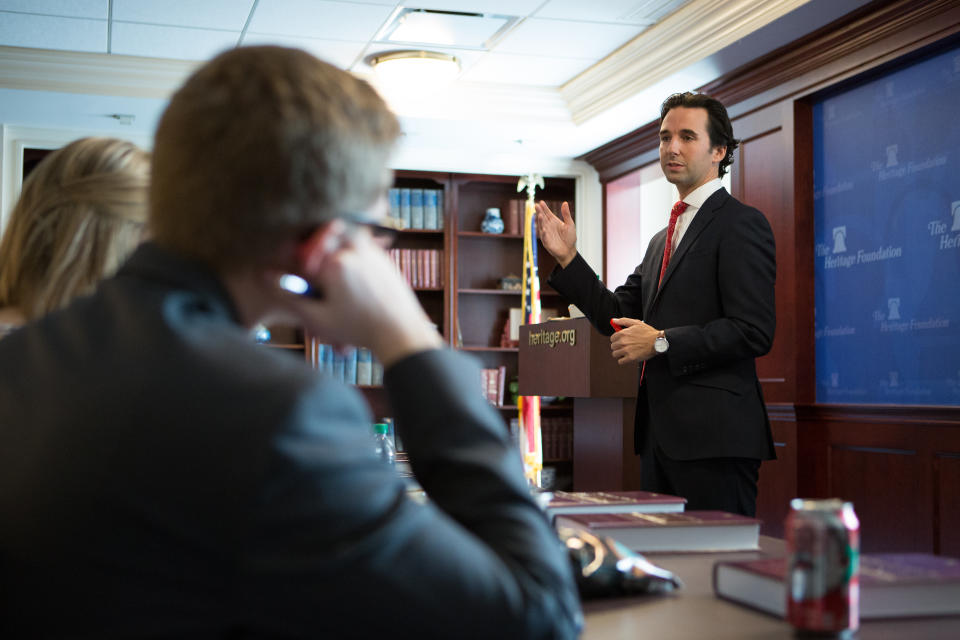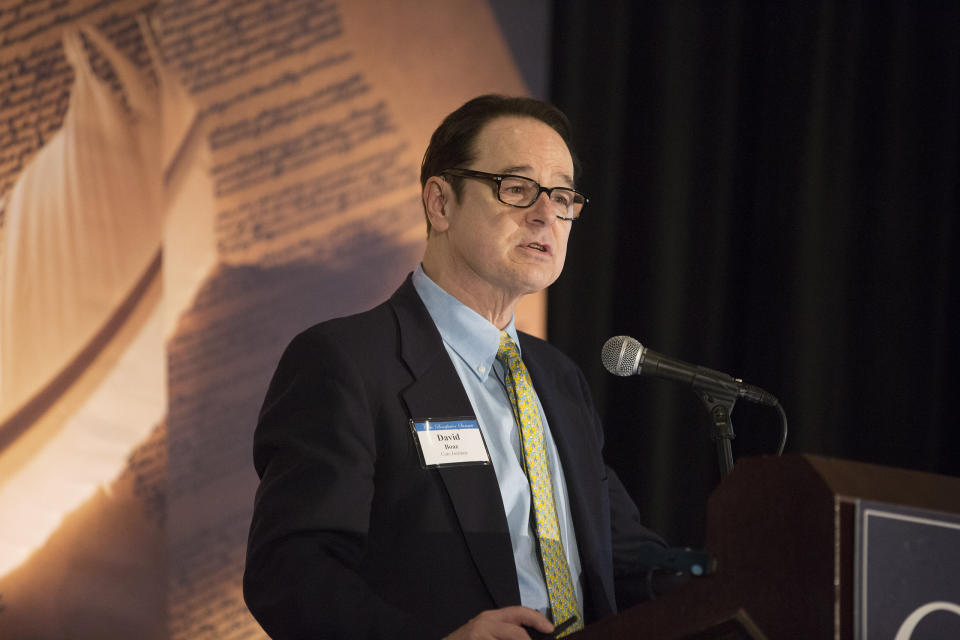Vying for the heart of conservatism in the Trump era

The Donald Trump phenomenon cast a national spotlight on rural and working-class communities that feel left behind by the rapidly evolving global economy. But how is the traditional conservative intelligentsia handling this sea change?
There’s always been a strong conservative intellectual movement that’s influenced politics in the United States. In the latter half of the 20th century, intellectuals like William F. Buckley Jr., Milton Friedman and Thomas Sowell helped shape conservatism and underpinned the policies of politicians like Barry Goldwater and Ronald Reagan.
President Trump’s unbridled populism has fanned the flames of resentment against intellectuals, including conservatives. He doesn’t embody typical conservative values — arguably in policy, certainly in life — and was forced to defend his conservative bona fides repeatedly during the Republican primaries.
Trump’s meteoric political ascent and upset victory confounded pollsters, talking heads and opponents, who were left wondering what happened. How could a former reality television star with a questionable reputation demolish every traditional politician in the overcrowded Republican primary and go on to secure the White House?
And how could men and women guided by reason and logic support a man with an apparent disregard for facts and the basic principles of governance?
Yahoo News reached out to several prominent conservative thinkers to see what they make of the Trump spectacle and what it portends about the future of conservatism.
It appears Trump’s presidency has divided conservative intellectuals into roughly three camps of uneven sizes: committed “never Trumpers,” steadfast supporters and people who opposed him during the campaign based on his character flaws but support him in office because — immature behavior aside — he’s pursuing policies they believe in.
Robert W. Merry, editor of the American Conservative, said he does not consider Trump conservative but that our definitions of these terms can change over time. He said he understands why Trump emerged: the gridlock in American politics calls for a new paradigm or collection of issues that can form a new coalition to break it.
“As I look at it, Trump had an instinct for that during the campaign. He understood that he could bring together what in our recent times would be considered disparate concepts,” he said.

According to Merry, Trump doesn’t seem to care about entitlement programs or the country’s huge unfunded liabilities, but he’s still delivering what could be considered traditionally conservative messages on immigration and tax reform. Trump was able to craft a message that resonated with the country’s beleaguered middle and working classes, he said. At this point, Merry just hopes Trump can actually help the people that he marshaled together to win the presidency.
“The guy’s uncouth. He’s crude. He’s reckless and we take that all into account. We don’t like those traits in any president, not least this guy because he’s particularly intense in so many of those faults,” Merry said. “And the question that we have is to what extent is he in terms of his stewardship worthy of his constituency. So we care about the constituency more than the man.”
Former President George W. Bush often characterized his personal philosophy as “compassionate conservatism.” And Trump, ever the businessman, has called himself a “common-sense conservative.”
In many ways, Trump’s election was a scathing indictment of politics as usual, including the conservative establishment. For starters, he doesn’t speak in the language of think tanks, as Marco Rubio or Scott Walker do. He didn’t need their support to win and seemed perfectly comfortable without their counsel, often boasting about his IQ, his alma mater and generally being “like a smart person.”
National Review, the influential conservative magazine Buckley founded in 1955, published an issue called “Against Trump,” featuring 22 prominent conservatives opposing his candidacy. The editorial board described Trump as a “philosophically unmoored political opportunist” who would be willing to destroy the ideological consensus within the GOP for “free-floating populism with strong-man overtones.”
“Some conservatives have made it their business to make excuses for Trump and duly get pats on the head from him. Count us out,” the board wrote. “Donald Trump is a menace to American conservatism who would take the work of generations and trample it underfoot in behalf of a populism as heedless and crude as the Donald himself.”
It wasn’t successful. Trump mocked them. He still won.
National Review is a failing publication that has lost it's way. It's circulation is way down w its influence being at an all time low. Sad!
— Donald J. Trump (@realDonaldTrump) January 22, 2016
Very few people read the National Review because it only knows how to criticize, but not how to lead.
— Donald J. Trump (@realDonaldTrump) January 22, 2016
The late, great, William F. Buckley would be ashamed of what had happened to his prize, the dying National Review!
— Donald J. Trump (@realDonaldTrump) January 22, 2016
National Review declined the opportunity to comment.
David Azerrad, director of the Heritage Foundation’s center for principles and politics, points out that much of the conservative opposition to Trump centered on his character rather than his worldview or his particular policies.
“That’s one thing to keep in mind. Are conservative intellectuals objecting to the man because they think his character is flawed or are they objecting to his ideas?” Azerrad said.
He cited an article called “The Comprehensive Case Against Donald Trump.” by Peter Wehner of the Ethics & Public Policy Center, a conservative think tank, from September 2016, as an example.
Azerrad suggested that Trump’s conservatism — rooted in borders and national solidarity — is more appropriate for the 21st century than the liberty-obsessed conservatism of the 1980s. He added that there’s too much nostalgia among right wingers for the Reagan era, when the Republican Party was unified behind freedom against the threat of global communism.

“The standard should not be how closely someone conforms to the way Reagan governed or looked at the world, because we’re living in a different era,” Azerrad said. “I do think at the broad level, Trump’s analysis of American politics is correct. There is a chasm that separates the elites from ordinary Americans, regardless of political affiliation. There is an erosion of a sense of a shared nationality in part because of unchecked immigration and the rise of identity politics.”
According to Azerrad, much of mainstream American conservatism looks at the world through a libertarian rather than strictly conservative lens. This results in speeches and talking points that focus most heavily on liberty and less government.
But he sees a divide here: mainstream American conservatives talk like Randians (Russian-American novelist Ayn Rand espoused a philosophy of individualism and radical self-interest) but live like Tocquevillians (French political theorist Alexis de Tocqueville greatly admired American democracy but worried about a “tyranny of the majority” trampling individual rights).
“There’s a certain disconnect between the rhetoric and some of their other beliefs and how they carry their lives,” he said.
David Boaz, the executive vice president of the Cato Institute and author of “The Libertarian Mind,” said it’s challenging for conservative intellectuals to hold onto the values and movement they helped to form under Trump.
“Not only do they have a Republican president who is not interested in those values. They have a broad swath of conservative media who have lined up as a media support system for Donald Trump. Who is the movement that National Review now speaks for?” he said.

Boaz said the Buckley-Goldwater-Reagan movement was fairly significant in shaping conservative politics. As he sees it, conservatism used to mean free enterprise, traditional social and religious values and a strong national defense, but now we have a Republican president who, he says, didn’t really run on that platform.
“His most important economic idea was protectionism along with blocking immigration. He’s clearly not a devotee of traditional social and religious conservatism. Manned defense, he’s been all over the map,” Boaz said. “Plus he kind of campaigned as a man of bad character and traditional conservatives always insisted that character was a part of statesmanship. So where does that leave conservatives?”
More specifically, Boaz said that libertarians have generally been critical of what he considers Turmp’s authoritarian, protectionist and anti-immigrant instincts all along.
“I think today what you can see is out in the country a lot of people are less focused than East Coast intellectuals are on White House chaos, the personal character of the president, the president’s respect for the separation of powers and issues like that. I think a lot of conservative and libertarian voters are seeing deregulation, the promise of a tax cut, Neil Gorsuch on the Supreme Court, a booming stock market and they are less concerned about what Trump is doing to constitutional government than I think they ought to be.”
When asked if he was hopeful about the future of conservatism, Merry said, “No, I’m not. I think traditional conservatism, what we might call the Buckley-Reagan combine, is no longer as resonant as it has been in the past.”



